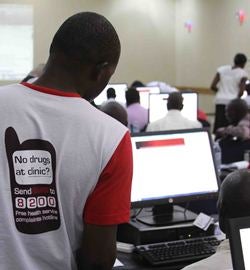Co-authored by: Yvonne Nkrumah and Julia Mensah (WBIHS), and Lyudmila Bujoreanu (TWICT) How satisfied are Uganda’s citizens with the services they receive in public health facilities? It’s a question that has important implications for Uganda’s efforts to improve service delivery and reform health systems, and one that was recently put directly to Ugandans, via crowdsourcing.
How satisfied are Uganda’s citizens with the services they receive in public health facilities? It’s a question that has important implications for Uganda’s efforts to improve service delivery and reform health systems, and one that was recently put directly to Ugandans, via crowdsourcing.
Last summer, the World Bank Group partnered with UNICEF and the Medicines Transparency Alliance (MeTA) to leverage two SMS-based platforms – U-report and mTrac – to generate real-time information from both citizens and health providers, providing critical evidence on health service delivery.
MeTA, an international multi-stakeholder coalition of government, private sector and civil society partners, led a ten-district survey in Uganda to establish a baseline on citizen satisfaction, medicine availability, and citizen empowerment in health service delivery. To collect data and reach more people quickly and cheaply, however, the coalition decided to use technology-driven platforms that could generate responses in real time. A partnership between MeTA and UNICEF allowed the coalition to leverage the U-report and mTrac tools.
Some of the survey and SMS results were eye-opening: Respondent satisfaction levels ranged from just 35% for laboratory services to 71% for the “attitude of the prescriber.” About 75% of patients said they were satisfied with the availability of medicines, while 50% were satisfied with the time taken to be attended to. Twenty-seven percent of respondents had filed a formal complaint about health care services, despite public perception that complaints are widespread. (See infographic for full results)
Areas identified for improvement, which will be presented to policymakers, included lack of trained staff in supply chain management, inadequate laboratory services and ineffective community involvement.
Tools for Citizen Engagement
U-report and mTrac, developed by UNICEF’s Technology for Development team in Uganda, proved highly effective in validating MeTA’s initial findings from the 10 districts where data was collected. The tools were used to poll both citizens and health facilities over 5 weeks, engaging them in targeted discussions on the use of feedback mechanisms and medicine supply chain challenges at the facility level.
U-report is a user-centered, social monitoring tool based on simple SMS messages (including poll questions and survey results) and designed to strengthen community-led development and citizen engagement.
The second tool, mTrac, is an SMS-based innovation that allows health facility workers to send government reports by SMS, including real-time data to map facility stocks with the aim to avoid stock-outs and to ensure transparency and accountability for drug supplies.
The impact these tools had on MeTA’s initiative can be summed up in three concepts: reach, speed, and cost efficiency. Through these technologies, the coalition had access to more than 16,000 Ugandans (three times the size of citizens surveyed at the community level using traditional survey instruments) and 2,100 health facilities (ten times the number of facilities surveyed through traditional channels), which they could poll in a matter of minutes, for about a penny-per-SMS message. Achieving such reach at such speed with very little cost was a new experience in Uganda. Within MeTA’s study, these technologies supplied a rapid and cost-effective way to map general sentiments on specific issues, further enabling them to fine-tune the design of their intervention.
Follow-up of the Uganda study is ongoing. MeTA is holding discussions this week with policymakers from the Ministry of Health, the National Medical Stores, and Joint Medical Store, civil society groups, and the private sector to address the most pressing issues raised by citizen responses. Additionally, the World Bank Group continues its collaboration with UNICEF in Uganda, to integrate ICT feedback mechanisms in enhancing delivery of public services, not only in health but in other sectors as well, including agriculture.



Join the Conversation